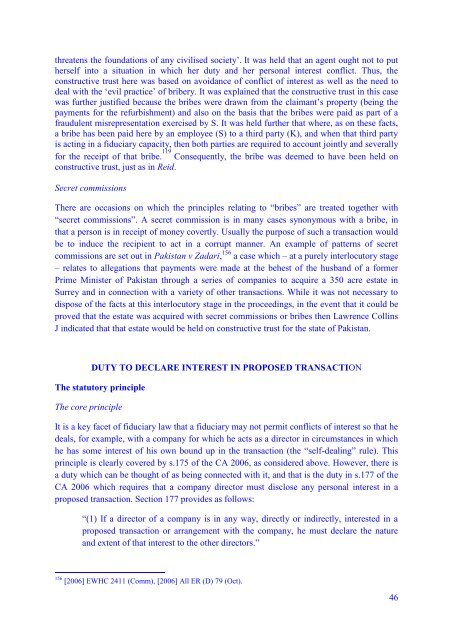Chapter 7 Directors' Duties - alastairhudson.com
Chapter 7 Directors' Duties - alastairhudson.com
Chapter 7 Directors' Duties - alastairhudson.com
Create successful ePaper yourself
Turn your PDF publications into a flip-book with our unique Google optimized e-Paper software.
threatens the foundations of any civilised society‟. It was held that an agent ought not to put<br />
herself into a situation in which her duty and her personal interest conflict. Thus, the<br />
constructive trust here was based on avoidance of conflict of interest as well as the need to<br />
deal with the „evil practice‟ of bribery. It was explained that the constructive trust in this case<br />
was further justified because the bribes were drawn from the claimant‟s property (being the<br />
payments for the refurbishment) and also on the basis that the bribes were paid as part of a<br />
fraudulent misrepresentation exercised by S. It was held further that where, as on these facts,<br />
a bribe has been paid here by an employee (S) to a third party (K), and when that third party<br />
is acting in a fiduciary capacity, then both parties are required to account jointly and severally<br />
for the receipt of that bribe. 119 Consequently, the bribe was deemed to have been held on<br />
constructive trust, just as in Reid.<br />
Secret <strong>com</strong>missions<br />
There are occasions on which the principles relating to “bribes” are treated together with<br />
“secret <strong>com</strong>missions”. A secret <strong>com</strong>mission is in many cases synonymous with a bribe, in<br />
that a person is in receipt of money covertly. Usually the purpose of such a transaction would<br />
be to induce the recipient to act in a corrupt manner. An example of patterns of secret<br />
<strong>com</strong>missions are set out in Pakistan v Zadari, 156 a case which – at a purely interlocutory stage<br />
– relates to allegations that payments were made at the behest of the husband of a former<br />
Prime Minister of Pakistan through a series of <strong>com</strong>panies to acquire a 350 acre estate in<br />
Surrey and in connection with a variety of other transactions. While it was not necessary to<br />
dispose of the facts at this interlocutory stage in the proceedings, in the event that it could be<br />
proved that the estate was acquired with secret <strong>com</strong>missions or bribes then Lawrence Collins<br />
J indicated that that estate would be held on constructive trust for the state of Pakistan.<br />
DUTY TO DECLARE INTEREST IN PROPOSED TRANSACTION<br />
The statutory principle<br />
The core principle<br />
It is a key facet of fiduciary law that a fiduciary may not permit conflicts of interest so that he<br />
deals, for example, with a <strong>com</strong>pany for which he acts as a director in circumstances in which<br />
he has some interest of his own bound up in the transaction (the “self-dealing” rule). This<br />
principle is clearly covered by s.175 of the CA 2006, as considered above. However, there is<br />
a duty which can be thought of as being connected with it, and that is the duty in s.177 of the<br />
CA 2006 which requires that a <strong>com</strong>pany director must disclose any personal interest in a<br />
proposed transaction. Section 177 provides as follows:<br />
“(1) If a director of a <strong>com</strong>pany is in any way, directly or indirectly, interested in a<br />
proposed transaction or arrangement with the <strong>com</strong>pany, he must declare the nature<br />
and extent of that interest to the other directors.”<br />
156 [2006] EWHC 2411 (Comm), [2006] All ER (D) 79 (Oct).<br />
46













